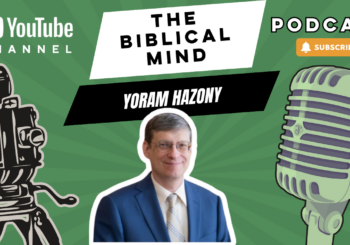We Should Regard These Two Overlooked Women as Biblical Matriarchs
The Patriarchs—Abraham, Isaac, and Jacob—are the three ancient forefathers of Judaism, Christianity, and Islam. For thousands of years, these three well-known names have been referenced in histories, liturgies, prayer books, and scholarly articles alike. The Matriarchs—Sarah, Rebekah, Leah, and Rachel, the corresponding mother figures—are increasingly being remembered and honored as well, to highlight their important role in forming the twelve tribes of Israel. Like many others, these named women have a voice, agency, and power within their stories, at least at times, and use it to achieve their ends. Most named biblical women are of this dynamic variety. They are the biblical women we view as relatable and worthy of emulation.
Enjoying this article? Read more from The Biblical Mind.
At the same time, two other named figures stand out for their undeserved absence among the honored Matriarchs. They are Zilpah and Bilhah. They are often presented as slave-like objects in the narrative with no voice, who only act at the behest of others. They are never presented as subjects with a voice, agency, or power. Thus, they have been forgotten as unworthy or ignored as unremarkable.
I first became fans of Zilpah and Bilhah when I was assigned them for a presentation in a graduate class on women in the Book of Genesis. My first reactions was: Who were they? I had never heard of them before. Most haven’t. I now discuss these two amazing biblical women every chance I get, including here, because their story resonates with so many who are voiceless or powerless. It’s a story of the quiet humility of marginalized women whose children have better lives as a result. I contend that these two women are relatable and worthy of emulation for different reasons than the more well-known Matriarchs are.
At the start of Jacob’s story, the Genesis narrator makes it clear that Zilpah and Bilhah are maid-slaves. What’s less clear, however, is their roles within the forming Israelite tribe, especially compared with the roles of Leah and Rachel. We will examine the compelling evidence regarding Zilpah and Bilhah’s wifely and motherly roles, which are fulfilled by the end of their story and elevate them to a well-deserved matriarchal status. But more importantly, we will question why these two women’s children receive blessings and an inheritance when other sons of women in other stories did not. And then we’ll consider how to respond to our findings.
In Jacob’s Household: The Maid-Slaves Gain a Wifely and Motherly Role
Though both Leah and Rachel were bought by Jacob to be his covenantal wives with his years of labor that functioned as a bride-price1cobs, Gender, Power and Persuasion: The Genesis Narratives and Contemporary Portrait (Grand Rapids, MI: Baker Academic, 2007), 160. (Gen 29), Jacob did not buy Zilpah and Bilhah to be his legitimate wives. Zilpah and Bilhah are instead each introduced as a shiphchah (meaning “maid-servant,” “slave-girl,” or “handmaid”2For “maid-servant” or “female servant” see such translations as JPS, ESV, and YLT; for “slave-girl” see CJB, EXB, GNT, ICB, and NRSV; for “handmaid” see ASV and KJV. I will use the term maid-slave to capture their feminine and slavish status. Tammi J. Schneider notes that a shiphchah or a female slave differs from male slaves by also carrying out sexual and procreative functions, as legislated in Leviticus 19:20, raising the question as to whether these same functions are inherent in the type of slavery this term conveys in the current context. See Schneider’s Mothers of Promise: Women in the Book of Genesis (Grand Rapids, MI: Baker Academic, 2008), 103–105.) to Laban, the father of Leah and Rachel. Laban gives Zilpah to Leah and Bilhah to Rachel as a maid-slave as part of their wedding dowry (Gen 29:24, 29). Each takes ownership of the maid-slave, much like Sarah owned Hagar (Gen 16:1) and Rebekah owned her nurse Deborah (Gen 24:61). The maid-slaves would not only serve the daughters, but they could also bear children for their mistress-owner as a surrogate if the mistress were barren. In their historical and cultural context, the mistress had full procreative rights over the maid-slave, including control of access and consent regarding her sexual behavior.3Jacobs, Gender, Power and Persuasion, 159–160, 168.
Zilpah and Bilhah’s relationship to their mistress changes when first Rachel and then Leah experience barrenness. After Leah has birthed four sons to Jacob, her competitive sister Rachel decides to give Bilhah, her shiphchah, to Jacob as an ‘ishah, meaning complicatedly “woman” or “wife” (Gen 30:4). In this context, it is better to translate the term as “woman,” because Rachel still retained full rights over Bilhah.4Louis Katzoff, “Nuzi Tablets,” Bible and Spade vol 1:2 (Spring 1988): 27.
Instead, Bilhah is gaining a new, elevated role, much as Hagar did with barren Sarah (Gen 16:3). Bilhah fulfills the procreative, wifely role for barren Rachel and acts as her proxy seed bearer. Any children born of the union were considered to be legally the children of the mistress wife. As Rachel says, “Behold, my ‘amah (servant) Bilhah. Come into her and she will bear on my knees so that I too can build [a family] through her”5 This is my own translation of the Hebrew text found in the Biblia Hebraica Stuttgartensia. (Gen 30:3). These maid-slaves’ children are owned by the mistress, because the mothers were also owned, even after being given as an ‘ishah to Jacob.
In all, Bilhah and Zilpah are given to Jacob by their mistresses to act in their place twice each to overcome barrenness, resulting in two sons each (Dan, Naphtali, Gad, and Asher). And in every case, the mistress wife names the children born to their maid-slave, also indicating that the children are adopted by the mistress as their own. In contrast, in Hagar’s case, Sarah does not view the son of the shiphchah Hagar as her own son after conception and soured relations (Gen 16, 21). Nor does Sarah name the child Ishmael.
While this parallel relationship gives insight into the newly-gained procreative roles of Zilpah and Bilhah, it also highlights Zilpah and Bilhah’s worth. They never speak in the narrative, interact with God, or are set free, like Hagar, but they also never show contempt for their mistress or run away, like Hagar (Gen 16).
The real difference between Hagar on the one hand and Zilpah and Bilhah on the other lies in their reactions to their situation.6Schneider, Mothers of Promise, 117–119. Zilpah and Bilhah were always cooperative with their mistresses, unlike Hagar. Probably all three maid-slaves desired to have children, as women were primarily valued for their reproductive capacities in the culture. But in having a child, Hagar becomes prideful and disrespects her mistress Sarah. It’s possible this difference of reaction is partially attributable to the support of fellow women. Zilpah and Bilhah, who are usually named together, had each other, while Hagar was alone. While Leah and Rachel, who are also often named together, competed against each other for Jacob’s attention and to accumulate sons, Zilpah and Bilhah were always accommodating, respectful, and supportive of each other and authority figures. It is to Zilpah and Bilhah’s credit, because of their honorable actions given their slave status, that their sons inherited alongside their mistresses’ children, when Hagar’s son, Ishmael, did not.
After birthing two children each for their mistresses, the maid-slaves’ wifely, procreative role ended and presumably Jacob’s sexual access to them. Instead, Zilpah and Bilhah’s motherly role comes to the forefront. Though the Genesis narrator always identifies and categorizes the children of Jacob by their biological mother, Bilhah and Zilpah are never termed “mother” to their children. However, Hagar is termed “mother” at the end of her story when she becomes free (Gen 21:21).7Schneider, Mothers of Promise, 164–166. Instead, these maid-slaves begin a surrogate-motherly role of raising their children.
In Genesis 31:17, Jacob and his household leave for Canaan without telling Laban. Laban pursues them and overtakes them ten days later (Gen 31:23). Upon parting ways again, Laban and Jacob make a pact before Jacob’s God. The crux of the agreement states that Jacob will not ill-treat Laban’s daughters or take other wives besides his daughters (Gen 31:50). This suggests that at this time, Jacob only had Laban’s two daughters as his legal, covenantal wives. And this is how Laban wanted it to remain. Importantly, this agreement prohibits Jacob from elevating Zilpah and Bilhah to the status of full wives, at least for now.
In Canaan: Zilpah and Bilhah Gain a New Status as Possible Wives
Though Jacob could never take any other wives apart from Leah and Rachel according to the pact with Laban, Zilpah and Bilhah’s status seems to be elevated after Rachel’s death. At the start of Joseph’s story and after Rachel’s death, the narrator says that Joseph tended the flocks with his brothers, who are the sons of Bilhah and Zilpah, his father’s nashim (meaning “wives” or “women,” plural of ‘ishah) (Gen 37:2). The only other time Zilpah and Bilhah are termed wife/woman is when their mistresses give them to Jacob to fulfill the procreative, wifely role in their mistresses’ place. In this instance, no functional role is in view. They are called nashim without any qualifier function—an identification never given to Hagar. Since Joseph’s story happens after Rachel’s death (and possibly Leah’s death, since we do not know when she died in Canaan), this may indicate a real change of status for the two maid-slaves. Many scholars, including Steinberg and Speiser, interpret this event as just that—a change of status to secondary wives or full wives of Jacob.8Schneider, Mothers of Promise, 128.
Once again we can see Zilpah and Bilhah’s worth in this scene. Presumably, Hagar raised Ishmael to act so badly when “playing” with Isaac that Sarah casts them out (Gen 21:9). Both Hagar and Ishmael respond in negative ways to their lesser status, which forfeits Ishmael the inheritance as Abraham’s son. In contrast, Zilpah and Bilhah’s children, Dan, Naphtali, Gad, and Asher, never directly speak or act within the tribal family,9Many of the brothers directly speak and act within the familial affairs. For instance, Reuben speaks and acts to dissuade the brothers from killing Joseph (Gen 37:22), Simeon and Levi speak and act after the rape of their sister Dinah (Gen 34:30), Judah speaks and acts on behalf of Benjamin over a stolen cup (Gen 44:18), Joseph speaks and acts by telling his brothers of his dreams of greatness (Gen 37:6), and Benjamin acts to weep with Joseph upon being reunited (Gen 45:14). The only other brothers who are not singled out with specific actions in the narrative are Leah’s two sons Issachar and Zebulun. much like their mothers, who, through their humility and forbearance, were eventually able to attain wifely status.
Though Zilpah and Bilhah could never have been the full wives of Jacob while the treaty with Laban stood, once Laban’s two daughters died, Jacob may have viewed the stipulation of no other wives as no longer applicable, since it was meant to protect Laban’s daughters. Thus, while in Canaan and after Rachel’s (and probably Leah’s) death, Zilpah and Bilhah were possibly able to transition in status to the wives of Jacob.
In Egypt: Zilpah and Bilhah’s Children Gain Equal Status as Sons
One last question remains. As opposed to Isaac’s story in which the maid-slave Hagar’s child is not included in the inheritance, the maid-slaves’ children are included in the inheritance in Jacob’s story. How is the difference to be accounted for? How did Zilpah and Bilhah’s attitude and possible wifely status affect their children’s status?
When the Israelites enter Egypt at Joseph’s invitation, the children of Zilpah and Bilhah are listed among the children of Israel with the qualifier that Laban had given Zilpah and Bilhah to his daughters (Gen 46:18, 25). There is no mention of their status as wives or maid-slaves at all. They are simply Zilpah and Bilhah. This lack of any qualifier title leaves the question of their status open ended. It does not negate the previous identification of them as possible wives in Joseph’s story.
At the end of the narrative (Gen 49), the children of Zilpah and Bilhah received blessings from their father Jacob at his death, along with Jacob’s other sons by Leah and Rachel. Interestingly, the mother is not directly named in any of the sons’ blessings. As the listing of the tribes and children has always been by the identified biological mother, this lack of motherly identification and categorization is thought-provoking. This seems to indicate equal status and equal inheritance for all the sons, irrespective of who their mother was—other than the double portion of the firstborn birthright given to Joseph, among Jacob’s children. We have here something amounting to a status change for the maid-slaves’ children. No longer are Zilpah and Bilhah’s children given a shared tent (Gen 31:33) or set in the dangerous frontal position of the caravan (Gen 33:2).
Whether or not Zilpah and Bilhah attained wifely status, there seems to have been a change of status for their children into equal sonship and equal inheritance. What is more, the lack of motherly connection on all fronts seems to indicate that this equal status was no longer given through their adoption by the mistress wives of Jacob. Could it be that Zilpah and Bilhah not only gained the status of full wife, but also of full mother? And this is why the children are mentioned sans mothers, because the difference in status was no more for any involved, mothers or children.
I contend that the reason Zilpah and Bilhah attained this full wifely and motherly status and that their children inherited lies in their quiet humility and cooperative attitude throughout their lives. They repeatedly chose to be willing, humble, and respectful, possibly knowing that this is what would get them what they desired—children of their own who would have a future. While Sarah, Rebekah, Leah, and Rachel used more competitive, empowered, persuasive, and often deceptive means to achieve their ends according to their privileged status, Zilpah and Bilhah wisely used cooperation and submissiveness within their less privileged status. Neither response is more praiseworthy. The point is that these women acted prudently in each given situation with the best interests of their children in mind. And that is the mindset at the core of any matriarch.
Revising the List of Biblical Matriarchs
Though there is some indication that Zilpah and Bilhah were elevated to a matriarchal status as the wives of Jacob, they were still not on par with Leah and Rachel, whose death or burial place is mentioned (Gen 35:19, 49:31). Zilpah and Bilhah’s deaths are never mentioned. And they are not buried in the cave of Machpelah where Leah and other honored family are buried, including Sarah and Rebekah 10Schneider, Mothers of Promise, 74–75, 137. (though Rachel is not buried there either).
If nothing else, we can surmise that the institution of marriage and the status and roles of women in such relationships in the ancient Near East were complex and often-changing, depending on circumstances. Zilpah and Bilhah’s status was at many times unclear and was one of transition as the narrative unfolded, adding to the complexities. Possibly because of this complexity and their inherent lowly slave status for much of their lives, Zilpah and Bilhah do not get equal status as Matriarchs along with Leah and Rachel, their contemporaries (and owners). It was not until after Rachel’s and probably Leah’s deaths that they were likely able to transition from their functional maid-slave roles as proxy-wives and surrogate-mothers into a new status as the full wives of Jacob and full mothers of their children. Thus, Zilpah and Bilhah stand in the shadows of their mistresses Leah and Rachel and have been undeservedly unremembered.
Yet, consistently the narrator of Genesis insists that the twelve sons of Jacob had four named mothers: Leah, Rachel, Zilpah, and Bilhah. Of the sixty-six descendants of Jacob who journeyed to Egypt, twenty-three are accorded to Zilpah and Bilhah (Gen 46)—that is more than one-third of the total. Nevertheless, just as consistently, Zilpah and Bilhah are not traditionally listed among the Matriarchs that include Sarah, Rebekah, Leah, and Rachel—the mothers of the higher social class of privilege who speak and act. This may be because Zilpah and Bilhah never speak within the narrative, nor are they spoken to directly. The few times the story tells of their actions (bearing sons and bowing before Esau),11Schneider, Mothers of Promise, 128. it is at the behest of others. They fade into the background so easily.
In light of their wifely and motherly contributions to creating the Israelite family of Jacob, regardless of their actual status in the narratives, their status as Matriarchs should be upheld and celebrated. In midrashic texts, Rabbis have long given Zilpah and Bilhah matriarchal status, alongside Leah and Rachel. If some liturgies listing the Matriarchs have been corrected to list Leah first, as the older daughter and first wife of Jacob,12Elizabeth Wyner Mark, “The Four Wives of Jacob: Matriarchs Seen and Unseen,” The Reconstructionist (Fall 1998): 22–24. why not correct the list to include the two maid-slave mothers?
Thus, we shall proclaim the following revised celebratory benediction: “Praised are You, Lord our God, and the God of our ancestors. The God of Abraham, Isaac, and Jacob. The God of Sarah, Rebekah, Leah, Rachel, Zilpah, and Bilhah. The great, mighty, and awesome God, God most high, who bestows loving-kindness and goodness and who creates everything. The promises of God endure from generation to generation. May the God of the Patriarchs and Matriarchs, the God whose covenant is eternal, bless you and make you fruitful. Amen.”13This amended liturgical prayer is based on the traditional, central Jewish liturgical blessing of praise, the Amidah or Standing Prayer, that invokes the blessing of the ancestors, some of which already have added the four matriarchal figures (though most have Rachel before Leah).
End Notes
1. Mignon R. Jacobs, Gender, Power and Persuasion: The Genesis Narratives and Contemporary Portrait (Grand Rapids, MI: Baker Academic, 2007), 160.
2. For “maid-servant” or “female servant” see such translations as JPS, ESV, and YLT; for “slave-girl” see CJB, EXB, GNT, ICB, and NRSV; for “handmaid” see ASV and KJV. I will use the term maid-slave to capture their feminine and slavish status. Tammi J. Schneider notes that a shiphchah or a female slave differs from male slaves by also carrying out sexual and procreative functions, as legislated in Leviticus 19:20, raising the question as to whether these same functions are inherent in the type of slavery this term conveys in the current context. See Schneider’s Mothers of Promise: Women in the Book of Genesis (Grand Rapids, MI: Baker Academic, 2008), 103–105.
3. Jacobs, Gender, Power and Persuasion, 159–160, 168.
4. Louis Katzoff, “Nuzi Tablets,” Bible and Spade vol 1:2 (Spring 1988): 27.
5. This is my own translation of the Hebrew text found in the Biblia Hebraica Stuttgartensia.
6. Schneider, Mothers of Promise, 117–119.
7. Schneider, Mothers of Promise, 164–166.
8. Schneider, Mothers of Promise, 128.
9. Many of the brothers directly speak and act within the familial affairs. For instance, Reuben speaks and acts to dissuade the brothers from killing Joseph (Gen 37:22), Simeon and Levi speak and act after the rape of their sister Dinah (Gen 34:30), Judah speaks and acts on behalf of Benjamin over a stolen cup (Gen 44:18), Joseph speaks and acts by telling his brothers of his dreams of greatness (Gen 37:6), and Benjamin acts to weep with Joseph upon being reunited (Gen 45:14). The only other brothers who are not singled out with specific actions in the narrative are Leah’s two sons Issachar and Zebulun.
10. Schneider, Mothers of Promise, 74–75, 137.
11. Schneider, Mothers of Promise, 128.
12. Elizabeth Wyner Mark, “The Four Wives of Jacob: Matriarchs Seen and Unseen,” The Reconstructionist (Fall 1998): 22–24.
13. This amended liturgical prayer is based on the traditional, central Jewish liturgical blessing of praise, the Amidah or Standing Prayer, that invokes the blessing of the ancestors, some of which already have added the four matriarchal figures (though most have Rachel before Leah).
Image created by Rubner Durais
Subscribe now to receive periodic updates from the CHT.





